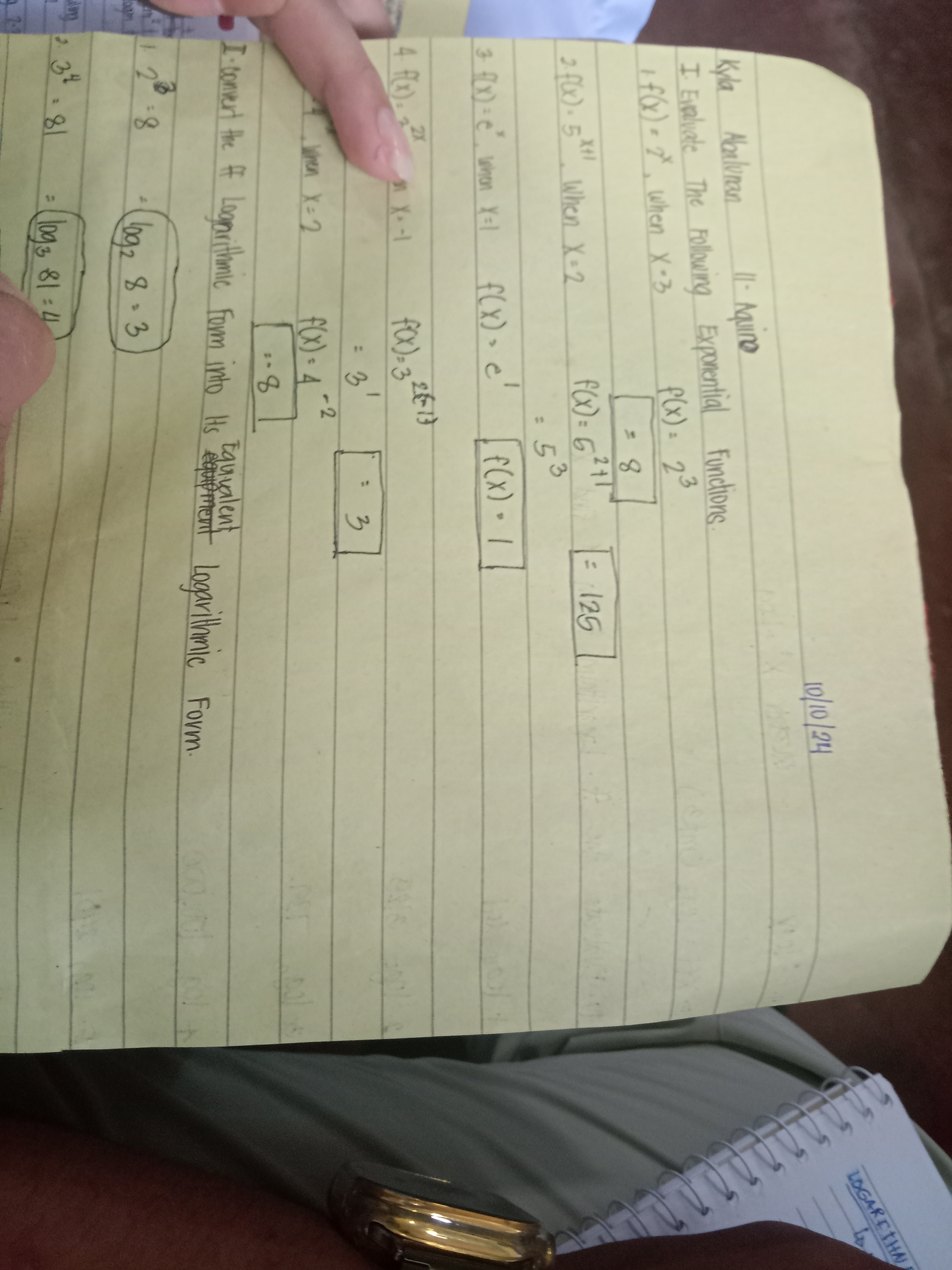Evaluate the following exponential functions: f(x) = 2^3 when x = 3, f(x) = 5^(x+1) when x = 2, f(x) = e^x when x = 1, f(x) = 2^(x-1) when x = 2. Convert the logarithmic form into... Evaluate the following exponential functions: f(x) = 2^3 when x = 3, f(x) = 5^(x+1) when x = 2, f(x) = e^x when x = 1, f(x) = 2^(x-1) when x = 2. Convert the logarithmic form into its equivalent logarithmic form.

Understand the Problem
The question involves evaluating various exponential functions for specific values of x and converting logarithmic expressions into their equivalent forms. It seems to focus on properties of exponential and logarithmic functions.
Answer
1. $f(3) = 8$ 2. $f(2) = 125$ 3. $f(1) = e$ 4. $f(2) = 2$ 5. $f(2) = 1$ 6. $\log_2 8 = 3$, $\log_3 3 = 1$, $\log_4 16 = 2$
Answer for screen readers
- $f(3) = 8$
- $f(2) = 125$
- $f(1) = e$
- $f(2) = 2$
- $f(2) = 1$
- Logarithmic forms:
- $\log_2 8 = 3$
- $\log_3 3 = 1$
- $\log_4 16 = 2$
Steps to Solve
- Evaluate $f(x) = 2^3$ when $x = 3$
Substituting $x = 3$ into the function gives: $$ f(3) = 2^3 = 8 $$
- Evaluate $f(x) = 5^{x+1}$ when $x = 2$
Substituting $x = 2$ into the function gives: $$ f(2) = 5^{2+1} = 5^3 = 125 $$
- Evaluate $f(x) = e^x$ when $x = 1$
Substituting $x = 1$ into the function: $$ f(1) = e^1 = e $$
- Evaluate $f(x) = 2^{x-1}$ when $x = 2$
Substituting $x = 2$ into the function gives: $$ f(2) = 2^{2-1} = 2^1 = 2 $$
- Evaluate $f(x) = 4^{2-x}$ when $x = 2$
Substituting $x = 2$ into the function gives: $$ f(2) = 4^{2-2} = 4^0 = 1 $$
- Convert the logarithmic expressions into equivalent forms
-
For $2^3 = 8$, the logarithmic form is: $$ \log_2 8 = 3 $$
-
For $3^1 = 3$, the logarithmic form is: $$ \log_3 3 = 1 $$
-
For $4^2 = 16$, the logarithmic form is: $$ \log_4 16 = 2 $$
- $f(3) = 8$
- $f(2) = 125$
- $f(1) = e$
- $f(2) = 2$
- $f(2) = 1$
- Logarithmic forms:
- $\log_2 8 = 3$
- $\log_3 3 = 1$
- $\log_4 16 = 2$
More Information
The calculations show how to evaluate exponential functions and convert certain exponential equations into logarithmic form. The use of $e$ represents Euler's number, an important constant in mathematics.
Tips
- Confusing the base and the exponent when substituting values in exponential functions.
- Misapplying the properties of logarithms, specifically in finding the equivalent logarithmic forms.
AI-generated content may contain errors. Please verify critical information